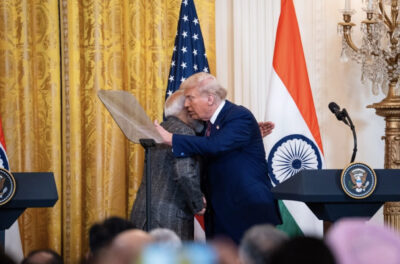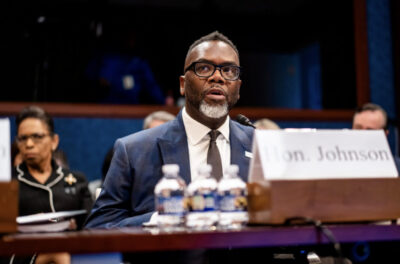By Catherine Yang
Contributing Writer
President Donald Trump said on Friday that China has “totally violated” its agreement with the United States after the two nations put a pause on escalating tariffs earlier this month.
In a Truth Social post, Trump said the 145% tariffs he had placed on China imports made it “virtually impossible” for China to trade with the United States. He said he opted to offer China a deal for their sake, referencing reports of civil unrest among Chinese citizens.
“Two weeks ago China was in grave economic danger!” he wrote. “Many factories closed and there was, to put it mildly, ‘civil unrest.’ I saw what was happening and didn’t like it, for them, not for us. I made a FAST DEAL with China in order to save them from what I thought was going to be a very bad situation, and I didn’t want to see that happen.”
On May 12, the two countries agreed to significantly reduce tariffs set since April 2 for 90 days, and markets rallied.
“Because of this deal, everything quickly stabilized and China got back to business as usual. Everybody was happy! That is the good news! The bad news is that China, perhaps not surprisingly to some, has totally violated its agreement with us. So much for being Mr. Nice Guy!” Trump wrote.
During a Friday press conference in the Oval Office, Trump said the Chinese regime violated “a big part” of the agreement, and signaled he would continue negotiations with Chinese President Xi Jinping.
“I was very nice to them, I helped them because they were in trouble with the stoppage of a massive amount of business,” Trump said.
“I’m sure I‘ll speak to President Xi and hopefully we’ll work that out. It’s a violation of the agreement.”
U.S. Trade Representative Ambassador Jamieson Greer said on CNBC on Friday that the United States has been monitoring China’s compliance with the latest agreement and that it’s “very concerned with it.”
“The United States did exactly what it was supposed to do, and the Chinese are slow rolling their compliance, which is completely unacceptable,” Greer said. “Time and time again, you know, we see the Chinese come down and not comply with their agreements, slow roll compliance, not open their economy like they should.”
Greer said the Chinese regime was the only government to counter U.S. tariffs when Trump first announced them, restricting exports of rare earth magnets and blacklisting U.S. companies, and after the Geneva agreement May 12, they have been slow to remove these countermeasures.
“You can see that Europe, Japan, United States, elsewhere, we haven’t seen the flow of some of those critical minerals as they were supposed to be doing,” he said.
White House deputy chief of staff Stephen Miller told reporters on Friday the United States could take action against this violation.
Miller said that immediately after the Geneva agreement, the United States adjusted tariff rates, but “China did not fulfill the obligations that it made and committed to with the United States.”
“That opens up all manner of action for the United States to ensure future compliance,” Miller said.
He said Trump still hoped China would open up to American business the way America has remained open to Chinese business “for a very long time now.”
On May 19, one week after the “truce,” China imposed anti-dumping tariffs on plastics from the United States, the European Union, Japan, and Taiwan, with the United States seeing the highest duties at 74.9%.
Experts have warned that Beijing will not adhere to trade agreements set, pointing to the Chinese communist regime’s history of ignoring deals made throughout the first Trump administration. The regime had also failed to curb exports of illicit fentanyl precursors as promised, saying it was because the United States had crossed a line by raising human rights issues and recognizing Taiwan.
In public statements to international media, Chinese regime spokespersons say they have adhered to international trade laws regarding recent tariffs. In China, Chinese Communist Party officials have said they will fight the United States even if it means incurring famine-level costs, echoing Mao Zedong-era rhetoric.
The legality of Trump’s tariffs is now being weighed by the courts. On Wednesday, the U.S. Court of International Trade struck down many of the tariffs, finding that the president did not have the authority to use an emergency powers provision in the way he had. The Trump administration appealed, and a federal appeals court reinstated the tariffs a day later while it reviews the case. Trump administration officials and experts have noted that the president has other means by which to set tariffs if the current method doesn’t hold.
The 90-day pause is meant to accommodate further negotiations, but on Thursday, Treasury Secretary Scott Bessent said on Fox News that trade talks between the United States and China were “a bit stalled.”
“I believe we may at some point have a call between the president” and Xi, he said. “Given the magnitude of the talks, given the complexity … this is going to require both leaders to weigh in with each other.
“I am confident that the Chinese will come to the table when President Trump makes his preferences known.”







